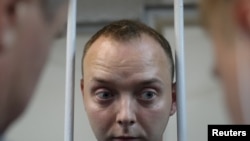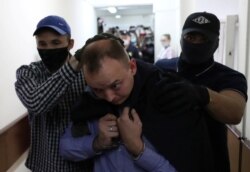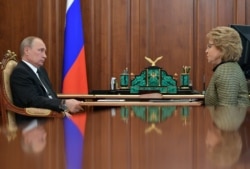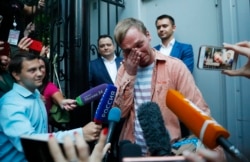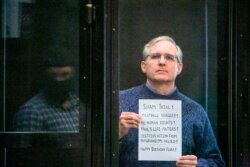A former Russian journalist currently employed by the country’s space agency has been arrested and charged with state treason for passing secrets to the West — punishment, his supporters argue, for his past coverage of sensitive Russian military and political affairs.
Ivan Safronov, 30, spent much of the past decade was a military analyst and reporter for Kommersant and Vedomosti, two vaunted national newspapers that have seen their independence increasingly clipped and key staff shakeups amid a wider curtailing of media freedoms in Russia.
Video released by Russia’s Federal Security Service, FSB, showed the former journalist quickly being detained by agents as he approached his car outside his home in Moscow on Wednesday morning.
“Safronov, carrying out tasks for one of the NATO countries’ intelligence services, gathered and handed over to its representative state secrets and information about military-technical cooperation and about the defense and security of the Russian Federation,” said the agency in a statement Tuesday.
Safronov has denied the charges and says the arrest is tied to his journalist work.
He could be heard saying “I’m not guilty” to reporters as agents frog-marched him into a closed court hearing.
A judge later ruled he remain in pre-trial detention until September 6, pending an investigation.
Allegations of spying for NATO
Safronov’s lawyer, Ivan Pavlov, says the FSB alleges Czech agents recruited Safronov in 2012 on behalf of the US, and that his client is accused of passing information about Russian military cooperation with a country in the Middle East and Africa to them in 2017.
“No evidence was presented on which those charges are based,” said Pavlov to journalists.
Yet Russian media attention has focused on publications that may have played a role in Safronov’s troubles.
In June 2019, the state launched court proceedings against Kommersant over allegedly disclosing state secrets. The article in question was widely considered to be a piece co-authored by Safronov that said the Kremlin was preparing the sale of Russian SU-35 Sukhoi fighter jets to Egypt, a U.S. ally.
The piece caught the attention of U.S. Secretary of State Mike Pompeo, who reacted by threatening Egypt with sanctions.
The deal never took place and the article has since been pulled from Kommersant’s online archives.
Safronov also provoked the ire of authorities as one of the authors of a 2019 article asserting that Valentina Matviyenko, the speaker of Russia’s Upper Chamber, was being pushed out of her position amid a Kremlin shakeup.
Kommersant’s management fired Safronov over the article amid the government pressure. Kommersant’s entire political department quit over the decision.
Today, Matviyenko remains in her post.
Two months ago, Safronov left journalism for a job as a media advisor to Dmitry Rogozin, Russia’s former Ambassador to NATO who currently heads Russia’s Space Agency, Roscosmos.
Roscosmos issued a statement insisting the arrest and nothing to do Safronov’s work at the agency.
Yet the Kremlin insisted Safronov’s journalistic work was not related to the charges.
”As far as we know this is not linked to his prior journalistic activity in any way,” said spokesman Dmitry Peskov.
Safronov had worked for a time in the so-called “presidential pool” covering the activities of Vladimir Putin.
Supporters detained
Outraged Russian journalists picketed in support of Safronov outside of FSB headquarters in Moscow — with a number of people briefly detained.
FSB representatives justified the arrests by pointing to restrictions outlawing protests amid to the coronavirus outbreak.
Protesters also expressed anger at the detention of journalist Taisiya Bekbulatova, the editor of the online portal Kholod and a friend of Safronov’s, after police raided her apartment and took her in for questioning related to the case.
“When they imprison one journalist after another — it’s a bad sign, a bad sign for the country,” said Kommersant reporter Alexander Chernikh, in a video posted to Twitter from the back of a police van.
«Когда один за другим сажают журналистов — это очень плохой знак, очень плохой знак для всей нашей страны». Задержанный корреспондент “Ъ” Александр Черных о деле Ивана Сафронова. pic.twitter.com/VHMmzkNuOQ
— Коммерсантъ (@kommersant) July 7, 2020
Kommersant issued a statement in support of its former reporter.
Ivan Safronov is a “real patriot of Russia, who wrote about the army and space agency, because he truly was worried about them. Suspicion of state treason in his case looks absurd,” read the statement.
Similar expressions of solidarity — and shock — followed from much of Russia’s independent media community.
A media crackdown?
The arrest comes against the backdrop of recent government moves against journalists in Russia in what some argue is an growing atmosphere of paranoia.
Svetlana Propkyeva, 40, a journalist in the western Russian city of Pskov, was convicted Monday of “promoting terrorism” for a column that examined the political motivations of teenage suicide bomber. Yet the judge spared her from a 6 year prison sentence requested by prosecutors.
Tuesday also saw formal charges brought against Pyotr Verzilov, the publisher of Mediazona, an online news portal specializing news about police abuse and Russia’s court and prison systems. An activist connected with the Pussy Riot collective, Verzilov is charged with hiding a second passport, a Canadian one, from authorities.
But to many, Safronov’s arrest carried echoes of the 2019 detention of Ivan Golunov, a well-known investigative journalist who was arrested by police on trumped up drug possession charges.
Amid intense media scrutiny of flimsy evidence presented, authorities eventually dropped the charges.
While Safronov’s supporters are preparing to launch a similar public campaign, some note that treason charges make examining the evidence in trial all but impossible.
“It will be carried out with maximum secrecy,” wrote Medizona editor Sergei Smirnov in a post to Facebook.
Last month, a closed trial saw Russia sentence former U.S. Marine Paul Whelan to 16 years in prison on charges of military espionage. Whelan denies the charges and U.S. officials have labeled the hearings a “mockery of justice” with no evidence presented.
Under Russian law, Safronov could face up to 20 years in prison if convicted.
Safronov developed skills as a military analyst in the footsteps of his father, Ivan Safronov Sr., who worked at Kommersant as a military analyst before his son.
He died in 2007 after falling from a 5th story of his apartment under disputed circumstances.
At the time, he was investigating illicit sales of arms to Syria and Iran.




